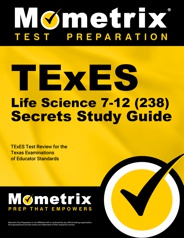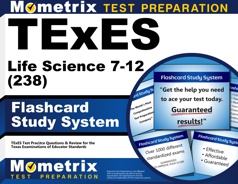The Texas Examinations of Educator Standards (TExES) Life Science 7-12 exam is used to assess the skills and knowledge of prospective entry-level Life Science teachers for 7th-12th graders in Texas public schools.
Click “Start Test” above to take a free TExES Life Science 7-12 practice test!
TExES Life Science 7-12 Exam Outline
The TExES Life Science 7-12 exam contains a total of 100 selected-response questions, and you will be given 4 hours and 45 minutes to complete it.
Teaching Standards
The exam is aligned with the nine standards for educators that have been outlined by the State Board for Educator Certification.
Click the button below to see the full list of approved educator standards:
Approved Educator Standards
Standard I: You are expected to manage the classroom, field, and lab activities to ensure student safety and the ethical care and treatment of specimens and organisms.
Standard II: You are expected to understand how to use materials, technologies, equipment, and tools correctly.
Standard III: You are expected to understand scientific inquiry and its role in science instruction.
Standard IV: You are expected to have practical and theoretical knowledge about teaching science and how students learn science.
Standard V: You are expected to know the appropriate assessments to monitor the learning of science.
Standard VI: You are expected to understand the history and nature of science.
Standard VII: You are expected to understand how science affects daily life and how science interacts with societal and personal decisions.
Standard VIII: You are expected to understand the science content appropriate to teach life science in the state of Texas.
Standard IX: You are expected to know the unifying processes and concepts that are common among all sciences.
Exam Domains
The exam is split into six domains, each of which covers one or more of the nine standards mentioned above.
For the questions in this domain, you will be asked to demonstrate your knowledge and abilities in the following areas:
- Selecting and managing learning activities to ensure student safety
- Correctly caring for and using natural resources, materials, technologies, organisms, and equipment
- The nature of science
- The process of scientific inquiry
- Unifying concepts that are common among all sciences
- The history of science
- The impact of science on daily life
- The interactions and influences of science on societal and personal decisions
2. Cell Structure and Processes
For the questions in this domain, you will be asked to demonstrate your knowledge and abilities in the following areas:
- The structure and function of biomolecules
- Specialized parts of cells and their specific functions
- The life processes carried out by cells
- The growth and development of specialized cells, organs, organ systems, tissues, and organisms
3. Heredity and Evolution of Life
For the questions in this domain, you will be asked to demonstrate your knowledge and abilities in the following areas:
- The structure and functions of nucleic acids in the mechanisms of genetics
- Variations and continuity of traits from one generation to the next
- The theory of biological evolution
- Evidence for evolutionary change during Earth’s history
4. Diversity of Life
For the questions in this domain, you will be asked to demonstrate your knowledge and abilities in the following areas:
- Similarities and differences between living organisms
- Using taxonomic systems to organize and interpret the diversity of life
- Living systems are found within other living systems
- The processes by which organisms maintain homeostasis
- The relationship between behavior and biology
5. Interdependence of Life and Environmental Systems
For the questions in this domain, you will be asked to demonstrate your knowledge and abilities in the following areas:
- The relationships between biotic and abiotic factors of terrestrial and aquatic ecosystems, biomes, and habitats
- The flow of matter and energy
- The interdependence and interactions of living things in terrestrial and aquatic ecosystems
- The relationship between carrying capacity and changes in ecosystems and populations
6. Science Learning, Instruction, and Assessment
For the questions in this domain, you will be asked to demonstrate your knowledge and abilities in the following areas:
- Research-based practical and theoretical knowledge about teaching science
- The role of scientific inquiry in science instruction
- Monitoring and assessing science learning in classroom, lab, and field settings
Check Out Mometrix's TExES Life Science 7-12 Study Guide
Get practice questions, video tutorials, and detailed study lessons
Get Your Study Guide
Exam Registration
To register for the exam, you must create an online NES account via their website. Once your account has been created, you can use it to register for the exam and schedule an exam date.
When you register, you will need to pay the $116 examination fee.
Test Day
You should arrive at the testing center 15-30 minutes before your scheduled exam time. Once you arrive, you will be asked to sign in and present one form of valid, government-issued photo ID. If your ID is invalid, you will not be permitted to take the exam that day.
After the check-in process, you will be asked to leave all personal items (phone, keys, wallet, etc.) in a locker outside the testing area.
Once you enter the testing room, you will be asked to sign an NDA, and you will be given a brief tutorial on the computer-adaptive testing system. Once the tutorial is complete, the exam will begin.
You are allowed to take a restroom break during the exam, but the timer will not be paused while you are away.
How the Exam is Scored
The TExES Life Science 7-12 exam is computer-adaptive. Here’s a look at how it works:
The first question is judged to be of medium difficulty, and depending on your performance, the next question may be easier or harder. If you do well on the first question, the second question will be harder; conversely, if you do poorly on the first question, the second question will be easy.
The questions on this exam are rated on a scale of 100-300. The higher a question is rated, the harder the question is (e.g., a question marked as 205 will be more difficult than a question marked 185).
To pass the exam, your final question must be on or above the 240 mark. If your final question is below this mark, you will not pass the exam, even if you have answered some questions above the 240 mark at some point during the exam. This is because the computer has rated the difficulty of your final question based on how you answered the previous questions.
Check Out Mometrix's TExES Life Science 7-12 Flashcards
Get complex subjects broken down into easily understandable concepts
Get Your Flashcards
FAQs
Q
How many questions are on the TExES Life Science 7-12 exam?
A
There are 100 selected-response questions on the exam.
Q
How long is the TExES Life Science 7-12 exam?
A
The time limit for this exam is 4 hours and 45 minutes.
Q
What is the passing score for the TExES Life Science 7-12 exam?
A
To pass the exam, you must achieve a minimum scaled score of 240.
Q
How much does the TExES Life Science 7-12 exam cost?
A
The examination fee is $116.


